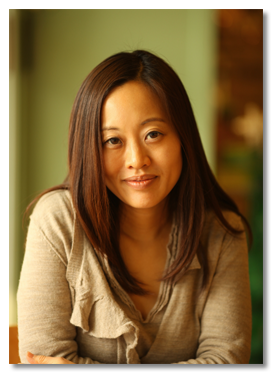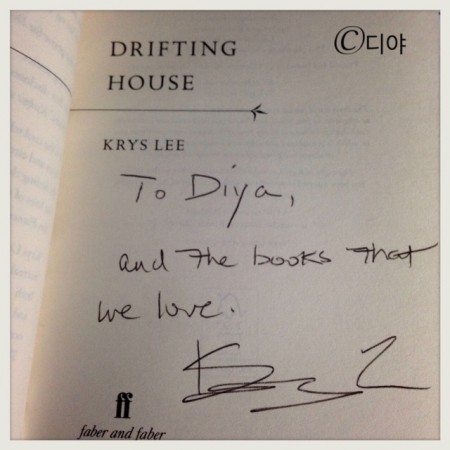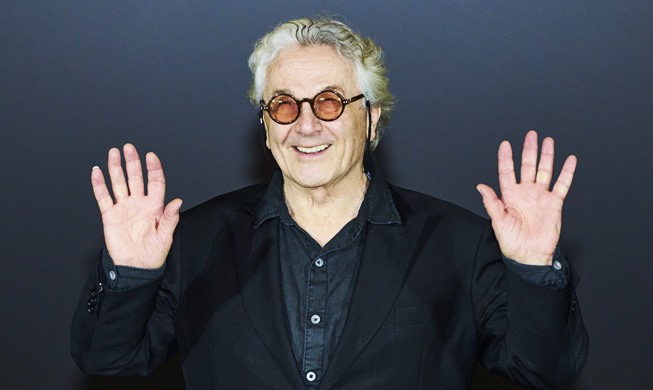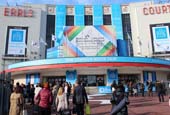-
 Korea.net's 24-hour YouTube channel
Korea.net's 24-hour YouTube channel- NEWS FOCUS
- ABOUT KOREA
- EVENTS
- RESOURCES
- GOVERNMENT
- ABOUT US
- 한국어
- English
- 日本語
- 中文
- العربية
- Español
- Français
- Deutsch
- Pусский
- Tiếng Việt
- Indonesian
It was quite exciting to be attending this year’s London book fair at the London Olympia, where Korea was the "market focus," under the collaboration of the British Council and the Literature Translation Institute of Korea. As well as attending themed discussions and other events over the span of three days where top Korean authors were able to discuss their works, I was also able to meet with publishers, columnists, translators and award winning writers.

Krys Lee (Photo: Matt Dourma)
One writer in particular was Krys Lee, who I had the pleasure to meet on the last day of the book fair at Asia House. Lee is the author of "Drifting House," a short story collection set in both Korea and the U.S. Born in Seoul, she emigrated with her family to live in the states. She studied in the U.S. and in the U.K. before returning to live in Korea. Most recently, she was awarded the Rome Fellowship in Literature 2014-2015 by the American Academy of Arts and Letters, and she also won the 2012 Story Prize Spotlight Award and was a finalist for the 2012 BBC International Story Prize. She currently works as a professor at the Yonsei University Underwood International College in Seoul, Korea, where she teaches creative writing.
Together with Yeusul Hwang, I was able to ask Lee a few questions before she had to dash off to take her agent, Sarah Saviit, out for dinner at the end of an interesting, intense three days at the London book fair.
Why do you think Korea was chosen as the "market focus" for the 2014 London book fair?
Korea is one of the ten biggest book markets in the world. It is the recognition it deserves for coming into its own and it shows that there is a growing number of titles that are coming out in English. It is on the cusp of explosive growth. There is now a desire to foster a greater market for the books coming out of Korea.
Did you enjoy the events at the book fair?
I attended five events in total, where I moderated at two of them and was on a panel at three of them. Unfortunately, I was not able to go to that many of the other events. I certainly enjoyed and was engaged in what I was a part of. I was able to catch some of the other events by Korean writers whose works I love, like Yi Mun-Yol. I loved his session at the Pen and it was great to see the writers not in a social setting, but in a different environment, and to hear them reflecting on their work. As a fiction writer myself, you allow people to be privy to the "secret self." When I saw Yi Mun-Yol speaking, I could see the person behind the book and it was a real privilege for me.
What positive outcomes do you think Korean literature will gain after the book fair?
It is not just about Korean literature. It is about great books and individual writers. Language is both an opportunity and a burden. The Korean language is such a musical language. It is in a world of its own and in the imagination of all these writers, it is particularly unique. Not only are they Korean writers, but they are writers, and here there are ten different writers with ten different imaginations. I think the excitement for the world and for me as a reader is the ability to be able to share these works both in English and in Korean with my friends.
To what extent is translation important in the course of promoting literature?
Translation is almost everything. It is 90 percent of the challenge. Translation of fiction or poetry is unlike that of any other text. How good of a writer you are is going to determine how good of a text is even possible. Korean and English have reverse syntax; reverse parts of the sentence. You have to reconstruct the sentence in English from Korean. The challenge of reconstruction demands a certain ability as a writer. I am currently translating Kim Youngwha and have also translated poetry in the past, so I have some experience in this. You need to have the understanding of the cadence of an English sentence and the sensitivity to know the difference between 20 different potential adjectives you could use that would best fit the context for this voice. A lot of people are not aware of these issues. The best translators working today, for example, are Sora Kim Russell, Deborah Smith, Jenny Wang Medina, Janet Hong, Brother Anthony and Jamie Lee. They all have this ability. If you know them individually, you find that they are fiction writers as well, or poets.
What do you think of the current scene in Korean literary translation?
A lot of the work coming out is great and exciting. They are certainly doing a good job of picking both modern classics and picking contemporary works and poetry. Maybe more drama would be wonderful. There is a lot of volume coming out of Korea right now and when you have a large volume of work being translated, you are going to sacrifice a certain amount of quality control. It is not just books, but stories and poems and works in all different languages, and archival work that is happening online.
At one of the events, you said you would always write in English and could never consider writing in Korean. Will there ever be a point that you would consider writing in Korean as a writer?
I hate going official with this, but maybe 20 years later, I might write something in Korean. You never know as an artist, where you want to go. I dream in Korean. I curse in Korean. My instinct, however, is to reach for Korean in my daily colloquial life. Korean actually comes to me much more intuitively than English does when I am back in Korea. My context is Korea. The language I wake up to is Korean. The language I go to bed in is Korean. Writing, however, is so much more a considered thing. I feel so far from the writer I want to be in English, how can I possibly be ready to write in Korean yet, when I am really dissatisfied with where I am as a writer in English. The strive for impossible perfection is what drives so many artists.
Once you think your work is an incredible book, you are really done for as a writer. You never say never, and I never imagined, for example, that I would want to make a documentary or toy with experimental film, but recently I have bought four or five books on these topics because I want to play in a different form. Maybe some day I will want to write in Korean, but I can’t predict that.
Would you say there is a new wave of Korean writers similar to yourself who are Korean but want to write primarily in the language of English?
I think there are definitely a lot of countries with writers like me who were born in one country and emigrated at a very young age or at a later age and then return, and also where the opposite happens. I know somebody who lived in Korea all their life and aged 16 they emigrated to the states. They are writing in English and have embraced America as their main culture. The students I teach at Yonsei University, some of them are writing in both languages. Others that grew up in Korea have been to international schools and are choosing to write in English, to reach a larger audience. Some of them reject Korean because of its honorifics -- that is, how one's social status is inherent in the language -- and choose English to write in as well, and some of them choose Korean because they decide there is more Korean in them than English. So it's a political decision and for each person it is different.
It was a wonderful insight into the mind of a literary writer, an author who is best-placed to understand the dynamics of both the languages of Korean and English. Unfortunately, I did not have the opportunity to delve further, as Lee had a prior appointment. Hopefully, there will be many more opportunities to speak to Lee in the future. Keep your eyes posted for my review of "Drifting House."
Thank you to Krys Lee for her time and to Yeseul Hwang for her questions.

Krys’ inscription of my copy of 'Drifting House'
Interview by Yeseul Hwang and Diya Mitra.
Written by Diya Mitra, a Worldwide Korea Blogger for the Korea Blog
Related Contents
Most popular
- First hearing-impaired K-pop act hopes for 'barrier-free world'
- 'Mad Max' director impressed by 'cinema-literate' Korean viewers
- Romanian presidential couple visits national cemetery
- President Yoon, Japan PM pledge better trilateral ties with US
- President, Romania pledge better defense, nuclear power ties














